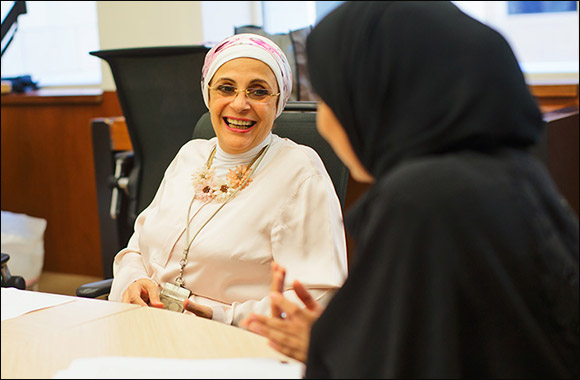
Reviving Modern Standard Arabic can Unify the Arab World
Carnegie Mellon expert believes MSA can bridge gap for Arab youth
Zeinab Ibrahim, sociolinguist and professor of Arabic studies at Carnegie Mellon University in Qatar, (CMU-Q), a Qatar Foundation partner university, believes that an emphasis on Modern Standard Arabic education and new language teaching approaches can revive the language and bring the Arab world together.
“Today, English is a lingua franca, meaning it is the bridge language used in international forums,” says Ibrahim.
As a result, many Arabs are prioritizing English language learning over Modern Standard Arabic. “Many families are only being exposed to English content, whether it’s movies, series, or songs, and this is a concerning phenomenon.”
“We should realize that the message we’re conveying to our children is that English is the primary language, through which they would eventually acquire the English culture.”
Reviving Modern Standard Arabic
Ibrahim says Arabic is a powerful language with a linguistic reality that is a combination of classical and colloquial. Modern Standard Arabic bridges the gap between Arab communities who speak different dialects. “We must leverage our dialects to promote Modern Standard Arabic ,” she said.
In fact, Modern Standard Arabic has helped Arab countries connect without turning each dialect into a language in its own right. Classical Arabic is also the language of Islam, which is common to Islamic countries.
“Thus, Modern Standard Arabic has a strong cultural and political impact. Yet, linguistic theories have emerged over the past decade stipulating that children should be taught the Arabic dialect rather than Modern Standard Arabic.”
Ibrahim believes this approach is incorrect. “In fact, many Arabs have contributed to the demise of the Arabic language by discouraging students from learning Modern Standard Arabic.”
Ibrahim has touched on this topic in an article she wrote about the “love-fear relationship” Arab students experience. She explains how students have a passion for the Arabic language and understand its importance on the political and religious levels, yet they feel that they do not master the language.
“Our role is to eliminate this concern by helping our children get a good hang of Modern Standard Arabic,“ says Ibrahim.
Modern teaching techniques
Ibrahim believes that part of decline in Modern Standard Arabic is due to a disconnect between Arabic language curricula and students. One reason is the use of decades-old teaching methods that focus mainly on grammar.
“While new teaching methods have been devised, they are yet to be applied in Arabic language classes,” she explains. “Grammar is essential to learning the language, but it’s not enough. For instance, students rarely listen to programs or news bulletins in Modern Standard Arabic.”
She recalls how education in the Arab world, prior to and during the early part of the last century, was mainly acquired in traditional schools. These schools taught children to memorize the Qur’an, which strengthened memorization and recitation skills.
“Traditional schools focused on memorizing the Qur’an, Ibn Malik’s millennium, and other linguistic and Islamic texts, but they didn’t host any discussions or readings on contemporary topics.”
Ibrahim believes a key to reviving Modern Standard Arabic is to bring teaching techniques in line with 21st-century pedagogical knowledge. “The methods applied in teaching English should also apply in Arabic classes. For instance, students should be asked to write daily diaries.”
Encouraging the production of programs, movies, songs, and series in Modern Standard Arabic is also an effective way to increase children’s exposure to the language.
“In fact, a study conducted by one of my former post-graduate students found that children who watched cartoons in Modern Standard Arabic learned the language,” Ibrahim notes.
“Today, we must consider modern linguistic theories that focus on expanding our children’s cognitive abilities by teaching them how to think and apply their Arabic language skills.”
Home >> Education and Learning Section
Mercato Wows Visitors with Circus Spectacles, Iconic Slide, and Weekly Cash Priz ...
Msheireb Properties Wins “Best Luxury Residential Development” and “Best Luxury ...
GTA: To date, exemptions exceeding QAR 900 million for more than 4,000 taxpayers ...
B-lounge doha celebrates the summer season with an enticing new b-lunch set menu
G-SHOCK's Summer Style Statement: Metal-Cased Watches That Define the Season
Msheireb Museums Unveils 2025 Summer Programme: Encouraging Creative Expression ...
MEEZA Signs Agreement with a Global Hyper-scaler to Utilize the Under-Constructi ...
Education Above All Foundation and Inter- American Development Bank Launch $100 ...
Keeta Sets Stage for Qatar Market Entry with Exclusive Founding Vendor Program f ...
Passenger Growth Hits 5% in May
Nasser Bin Khaled Automobiles Hosts Private Screening of 'F1: The Movie' In coll ...
May Air Cargo Demand Up 2.2% Despite Trade Disruptions
Qatar Insurance Group Earns MSCI's Highest ESG Rating, Cementing Its Leadership ...
Zulal wellness resort partners with qatar airways privilege club to offer exclu ...
Education Above All Foundation Announces New Collaboration with the American Cha ...
Auto Class Cars Launches its Special Summer offer on Maxus D60 and D90 max SUVs
Qatar Automobiles Company – FUSO: Driving Progress Across Industries in Qatar
Dukhan Bank Ranks #62 on Forbes Middle East's Top 100 Listed Companies for 2025
Nissan hosts world premiere of all-new Patrol NISMO in the Middle East, elevatin ...
The Mitsubishi Montero Sport.. Attractive design, High Performance and Durable


